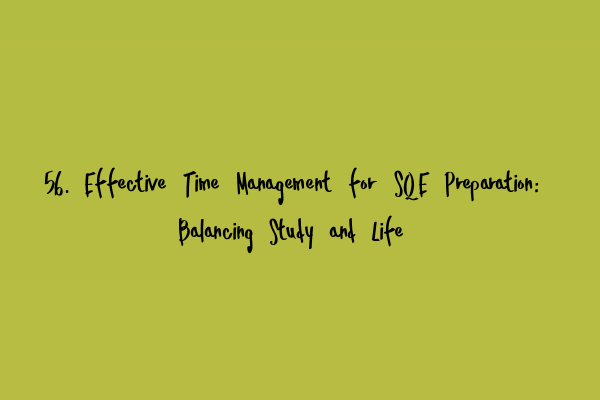Effective Time Management for SQE Preparation: Balancing Study and Life
Gearing up for the Solicitors Qualifying Exam (SQE) requires a comprehensive study plan and exceptional time management skills. With the SQE being a challenging and demanding exam, it is crucial to strike a balance between your study commitments and personal life. In this blog post, we will discuss effective time management strategies to help you optimize your SQE preparation while still maintaining a healthy work-life balance.
The Importance of Time Management
Time management plays a pivotal role in maximizing productivity and efficiency during your SQE preparation. By effectively managing your time, you can allocate dedicated study hours, complete practice exams, and tackle any other commitments with minimum stress.
Proper time management also enables you to focus on specific areas of the SQE that require additional attention. With well-structured study sessions, you can effectively cover all the required subjects and ensure a holistic understanding of the exam material.
Creating a Study Schedule
A study schedule is your blueprint for success. It helps you stay organized, ensures regular study intervals, and allows you to cover all the necessary topics within a set timeframe. Here’s how you can create an effective study schedule:
- Assess your availability: Start by identifying your available study hours. Consider your work schedule, family commitments, and any other responsibilities that may impact your study time.
- Set realistic goals: Break down the required subjects and topics into manageable chunks. Set realistic goals for each study session to avoid overwhelming yourself.
- Prioritize: Identify the areas that require more attention and allocate more time to them. Prioritize based on their importance and your current level of understanding.
- Create a routine: Establish a consistent study routine by allocating specific time slots for studying each day. This helps develop discipline and makes it easier for you to stick to your schedule.
- Include breaks: Don’t forget to include short breaks during your study sessions. Breaks help rejuvenate your mind, enhance focus, and prevent burnout.
By creating a study schedule tailored to your individual needs, you can effectively manage your time and allocate sufficient study hours without sacrificing your personal life.
Utilizing Productivity Techniques
Various time management and productivity techniques can further optimize your SQE preparation. Here are a few techniques that can help you make the most of your study time:
- The Pomodoro Technique: The Pomodoro Technique involves studying for 25 minutes, followed by a short 5-minute break. After completing four study sessions, take a longer break of around 15-30 minutes. This technique helps maintain focus and avoids burnout.
- Chunking: Chunking involves breaking down complex topics or tasks into smaller, more manageable parts. By tackling these smaller portions one at a time, you can enhance your understanding and retention of the material.
- Eliminate distractions: Minimize distractions during your study sessions. Put your phone on silent, close unnecessary browser tabs, and create a dedicated study space to minimize interruptions.
- Set deadlines: Assign deadlines to specific study goals or tasks. By setting realistic deadlines, you create a sense of urgency and prevent procrastination.
By incorporating these productivity techniques into your study routine, you can increase your efficiency and make the most of your study time.
Balancing Study and Life
While the SQE is undoubtedly a significant commitment, it is crucial to maintain a healthy work-life balance throughout your preparation. Here are some tips to help you strike the right balance:
- Plan social activities: Allocate specific time for socializing with friends and family. It is essential to take breaks and engage in activities that provide mental refreshment.
- Exercise regularly: Regular exercise helps maintain physical and mental well-being. Incorporate exercise into your routine to manage stress and improve focus.
- Practice self-care: Take care of your mental and emotional well-being. Practice mindfulness, engage in hobbies, and allocate time for relaxation.
Remember, a well-rested mind is more productive and efficient in studying. Balancing both your study commitments and personal life will lead to a well-rounded and successful SQE preparation journey.
In conclusion, effective time management is essential for successful SQE preparation. By creating a study schedule, utilizing productivity techniques, and maintaining a healthy work-life balance, you can optimize your study time and achieve the best possible results in the SQE. Prioritize your study goals, stay focused, and don’t forget to take care of yourself along the way.
For additional resources related to SQE preparation, please check out the following articles:
